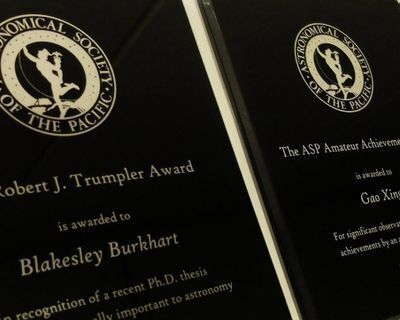Gordon Myers Amateur Achievement Award
For significant observational or technical achievements by an amateur astronomer
The Gordon Myers Amateur Achievement Award recognizes significant observational or technological contributions to astronomy or amateur astronomy by an individual not employed in the field of astronomy in a professional capacity.
In 2018, the ASP Board of Directors decided to honor Board Member Gordon Myers’ contributions to the ASP by naming the Amateur Achievement Award after him. Gordon has been instrumental in steering the Society over the past decade and it is a suitable honor for his dedication.
-
The Gordon Myers Amateur Achievement Award will next be given in 2027

Dan Caselden, Research Associate at the American Museum of Natural History receives the 2023 Gordon Myers Amateur Achievement Award for his contributions as a citizen scientist propelling the science of brown dwarfs and the methods of machine learning
San Francisco, California – September 27, 2023 - Recognizing significant observational or technological contributions to astronomy or amateur astronomy by an individual not employed in the field of astronomy in a professional capacity, the 2023 Gordon Myers Amateur Achievement Award goes to Dan Caselden for reshaping the understanding of what is possible in volunteer-research.
A Principal Software Engineer at Netskope by trade, Caselden is also a revered citizen scientist whose dedication to science research began in 2017 when he created an interactive browser tool to visualize data from any part of the sky using imaging from NASA’s Wide-field Infrared Survey Explorer (WISE) and NEOWISE missions.
The “Backyard Worlds: Planet 9” citizen science project on the Zooniverse platform in early 2017 caught Caselden’s eye on Reddit. His experience helping answer questions from other users inspired him to create a new, efficient visualization tool, WiseView, with a fellow data scientist. What followed was a surge of brown dwarf discoveries and over the following five years, Caselden’s pioneering the application of machine learning techniques to discover extremely important and unusual cosmic treasures. Three of them are among the very coldest known brown dwarfs now approved as James Webb Space Telescope (JWST) Cycle 1 targets. Others are members of a “second new class of brown dwarfs…extreme T-type subdwarfs” that may be the coldest and lowest mass objects formed in the Galaxy’s earliest generation of stars.
Caselden’s selfless contributions to brown dwarf research, and the timing of the discoveries prior to Spitzer’s retirement in 2020 and prior to the start of JWST’s mission, accentuates his immense technical abilities in machine learning as well as his deep commitment to creating publicly accessible astronomy tools. A former colleague praises how Caselden’s “rare combination of software, data visualization and web programming skills has been and will continue to be a truly unique asset to the field of astronomy for many years to come.” Rather than take all the credit, Caselden allows others to take ownership of writing publications, grants, or follow-up observing proposals. “There is no limit to how much he wants to know and contribute, and he asks nothing in return”, emphasizes a researcher who worked closely with Caselden on the Backyard Worlds: Planet 9 project.
A continued dedication to supporting citizen science has led Caselden to three important collaborations beyond his “day job” as a computer security researcher. All on his own time, Caselden is a collaborator at Caltech on the CatWISE astronomical source catalog of over ten years of WISE images; co-investigator on NSF’s NOIRLab’s Backyard Worlds: Cool Neighbors, a NASA-funded, citizen science in development spinoff of Backyard Worlds: Planet 9; and lastly a volunteer affiliate at the American Museum of Natural History as a Research Associate.
Join us in celebration of Dan Caselden’s achievements at the in-person ASP Awards Gala on Saturday, November 11, 2023 at the Grand Bay Hotel San Francisco in Redwood City, California.
Please contact the Awards team if you have questions about the nomination process

